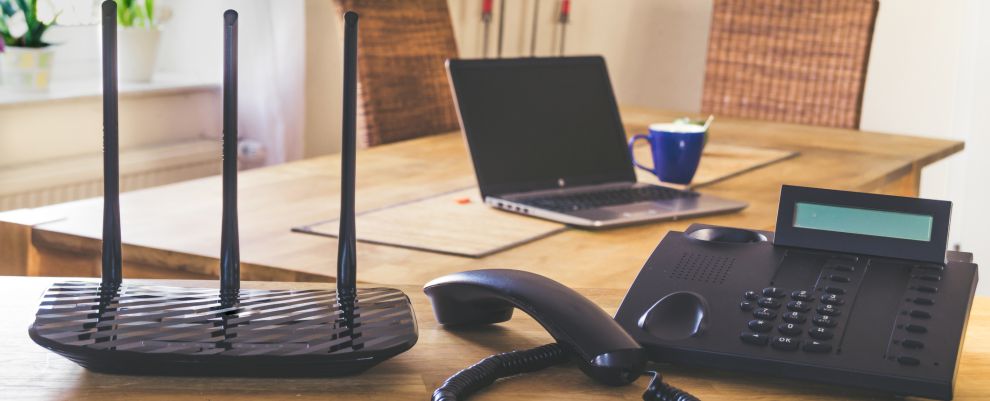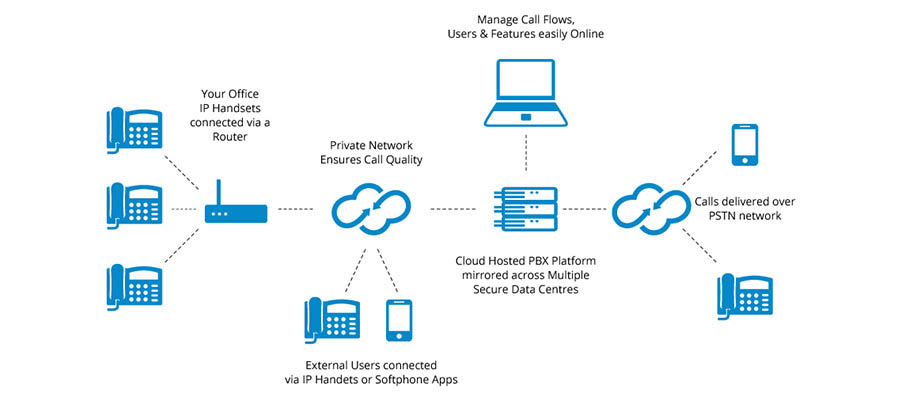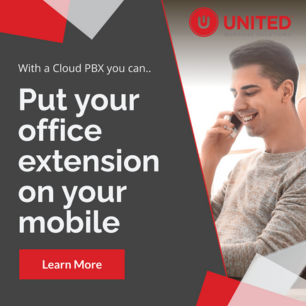Cloud Hosted PBX Systems, Voice over Internet Protocol (VoIP) Resources
What Are The Differences Between Cloud PBX and VoIP? (and how do they work together)

Cloud PBX and VoIP are often mentioned interchangeably but in fact are very different concepts from one another and are important in telecommunications for different reasons. While VoIP is a type of calling technology or standard, a Cloud PBX is the computer-based brain of a business’ communication system. When used together, a Cloud PBX and VoIP provide an excellent solution to an organisations telecommunications needs.
It’s important to get an understanding of VoIP and Cloud PBX, their differences, and how Cloud PBX and VoIP are used together to set up a custom calling solution. Below we lay out the key terms and differentiators between them so that you can make a more informed decision whether with United Telecoms or your chosen provider.
Table of Contents
- What is Cloud PBX?
- How VoIP and Cloud PBX work together
- How Cloud PBX and VoIP work together and benefit business communication
- Final thoughts on Cloud PBX vs VoIP
What is VoIP?
VoIP, stands for Voice over Internet Protocol, and is the technology standard utilised to make and receive voice calls using an internet data connection. It’s the essential connection that enables a conversation to be conducted between two or more parties over an internet data connection.
VoIP is more integrated into our lives than we might realise and isn’t just present in the context of a business phone system. For example, when making a Whatsapp voice call, or utilising your internet connection to make or receive calls using Skype – this works using VoIP.
How is VoIP used in businesses?
In a business context, customers will often state that they want VoIP, in reality, this usually involves switching from copper telephone lines traditionally used as an analogue communication solution to an IP-based solution (run through their internet connection) to manage their communications (VoIP).
During this process many people’s main concern is the loss of their incoming landline number, luckily with the advent of Number Porting this is no longer a concern, customers can port their landline number to VoIP so they can retain it for future use with their new VoIP solution.
How is VoIP used with analogue PBX systems?
VoIP can also be used with traditional analogue PBX systems. When customizing an analogue PBX system into a solution that incorporates VoIP, voice traffic utilises a VoIP gateway (a small box which sits next to the on-site PABX) to convert analogue signals into digital signals. These digital signals are then compressed and converted into packets which are transferred across an internet network connection rather than copper telephone lines.

What is a Cloud PBX?
A Cloud PBX/PABX can be simply defined as the brain of a business’ telecommunications solution. A Cloud PBX encompasses the functionality and features of a phone system. Read our other post learn more about the differences between a Cloud PBX and an On Site PBX.
A Cloud PBX provides functionalities you may expect with more advanced phone systems at no additional cost, this is due to the fact that the PBX is updated monthly, these updates are then populated to your system, much like a Smartphone update. While traditionally, PBX systems required a bundle of on-site hardware to enable features such as call routing and recording, these functionalities are standard in the cloud with a Cloud PBX solution.
Cloud PBX’s have essentially taken standard and advanced features provided by on-site PBX hardware and rolled them up into a data centre, which is secure, has multiple redundancies and is monitored 24/7. This limits the need for costly and space-consuming on-site hardware.

How VoIP and Cloud PBX work together
While VoIP is the essential technology enabling voice communication relying on an internet connection, Cloud PBX encompasses the functionality and features of a traditional switchboard phone system without the physical hardware.
These two technologies work hand-in-hand to take business telecommunications to the next level, improving efficiency, service delivery, ease of use, and saving on costs by a reduced requirement on physical hardware.
VoIP enables Cloud PBX systems to facilitate communication and other IP-based calling features, providing a holistic phone system solution that benefits. Basically, by combining a Cloud PBX with VoIP you end up with a system that allows you to call Local, National, Mobile and International numbers as you need to do with your Business Telephone System.
How a Cloud PBX and VoIP can benefit business telecommunications
So we’ve defined what VoIP and Cloud PBX refer to and how they work, but what are some of the specific differences and benefits of each?
To clearly understand the differences between Cloud PBX vs VoIP, it’s better to point out the solutions and benefits they provide and how this relates to an overall calling solution.

1. VoIP allows you to utilise an internet connection to make and receive calls
VoIP is the core technology that is utilised to make or receive calls using a data connection.
VoIP typically utilises a fibre connection or LTE connection, to transfer digital audio signals between two or more participants engaged in a call.
When integrating an existing analogue PBX system, a VoIP gateway is used to convert audio signals into digital ones before they are transferred in data packets via a network.
2. VoIP enables reduced call rates
VoIP call rates are significantly lower than call rates associated with copper landline calls.
Landline calls are usually charged on a per-minute basis, and when dialling cell phones from a landline, rates are elevated. Similarly, international per minute call rates are often very high and they may be associated with an upfront cost for placing the call. Smart Cloud PBX’s like the Aircall system use VoIP to reduce International Call rates to close to local call rates.
With VoIP, calls are usually charged on a per-second basis and rates for calling cellphone numbers, landline numbers and international numbers are often comparable. This ensures that with VoIP you only pay for what you use and are able to save significantly on your phone bill especially in an increasingly mobile and globalised business world.
3. VoIP mitigates the need for installing a costly, fixed telephone line & hardware
VoIP is renowned for its cost-saving benefits. With traditional telephone landlines, physical installation of copper landlines is a costly requirement; as is the additional hardware (internal network, handsets etc) to manage your business’s communication demands. They are also prone to theft and damage.
With VoIP, a fibre or LTE network connection allows voice calls to be conducted between participants on a call with no physical lines required. As long as you have a reliable internet connection in place you can integrate with VoIP.
The requirement for handsets is also drastically reduced as VoIP software can be installed on computers and other devices. For mobile or remote employees, simply use your smartphone to connect to the Cloud PBX and make VoIP calls.
4. VoIP reduces monthly line rental costs
Monthly line rental costs per landline are typically around R150p/m with Telkom.
With VoIP, you are charged per extension used, and the rate is significantly lower, usually ranging from R50-R100 per month depending on the provider.
Removing unused extensions is also possible and can be actioned online. This is useful when scaling down monthly costs based on demand, whereas once you’ve installed physical landlines, you are tied into those fixed monthly line rental fees.
Adding extensions can also be actioned in minutes, and may incur an additional charge per extension used (R65 p/m with United Telecoms). If you’re planning for significant growth and require multiple new extensions, you may want to consider your VoIP package that may include a set number of extensions and this can be upgraded easily, and at an affordable cost.

5. VoIP provides superior call quality when relying on a high-speed internet connection
In the past, a primary concern with VoIP in South Africa centred around VoIP’s call quality. This was at a time when broadband connections and fibre connections either weren’t as present, fast, or reliable, as they are today.
Implementing VoIP today is the best choice for most businesses, and when utilising a high-speed internet connection, VoIP will provide crystal clear call quality. Many companies are also able to instantly assess voice issues using smart monitoring software which is unavailable for GSM or Copper Lines.
6. Cloud PBX is the brain of the system
While VoIP technology is used to facilitate a call between parties over a data connection, Cloud PBX takes care of all of the functionalities you would expect from a business phone system (think switchboard, call holding, interactive menus, voicemail to email and more).
As the name suggests, a Cloud PBX manages the features associated with PBX phone systems but instead of relying on hardware, the features are based in the cloud and managed virtually. When troubleshooting, changing or upgrading the cloud-based “brain” of your PBX system, work can be performed remotely ensuring rapid support.
This gives Cloud PBX many advantages over traditional PBX systems such as: being easier and cheaper to maintain, ensuring greater uptime, allowing far more flexibility with hybrid and remote working, simple connectivity between different office locations, and access to a greater range of features without needing to upgrade any hardware and wait for on-site technical support.
7. Cloud PBX improves internal & external communications with useful features
The features provided by Cloud PBX can improve a company’s communication within their team, and facilitate the effective management of customers based on their needs, slotting right in with your business processes.
A Cloud PBX lets businesses curate an enhanced customer experience and improve team performance. Auto-attendant, interactive voice response (IVR), call recording, call routing and many more features help companies assist their customers more effectively, and provides the tools for better collaboration between employees.
Instead of having to install on-site hardware as you would with traditional PBX systems, Cloud PBX systems facilitate these features virtually and the management of these features can be handled remotely, usually by a central software dashboard via desktop and mobile devices.

8. Cloud PBX reduce reliance on hardware and scales easily with your business
While VoIP mitigates the need for physical copper landlines and their costly installation, Cloud PBX takes things a step further by taking all of the usual features you would expect from an on-site PBX system into the cloud. Expanding your virtual phone system by adding extensions or useful features can be handled virtually, with a few clicks and at a reduced cost when compared to analogue phone systems.
This reduces a business’s need to rely on installing expensive on-site PBX hardware, handsets, peripherals and other equipment, that often need to be expanded or upgraded in the future to help you manage the demands of a growing business. In some instances, smaller business can choose to mitigate the need for physical phone system handsets completely, as they may choose to utilise softphone functionality, which allows businesses to manage calls via apps on mobile and desktop devices.
Final thoughts on Cloud PBX vs VoIP
In summary, when implementing a modern phone system for businesses to manage their communications, VoIP and Cloud PBX work together to provide a complete IP-based solution.
This IP-based calling solution is able to provide all of the features one would normally associate with a traditional phone system, and many more advanced features, while saving upfront or monthly recurring costs associated with installing physical landlines, PBX hardware, physical handsets and peripherals. It also improves the flexibility a business has to scale up or downscale their phone system depending on factors such as team size and call volume.
Cloud PBX systems and VoIP are suitable for individuals and businesses, and custom solutions are typically implemented depending on the specific requirements of an individual customer or business.
At United Telecoms, over 3000 businesses trust us to provide telecommunication solutions across South Africa. For the past 30 years, we have specialised in providing phone systems that perfectly match the demands of small and medium-sized businesses as well as large enterprises.
We assess each customer’s unique requirements as well as many related factors such as team size and the scalability of your solution, call volume, security, specific customer contact processes, and your existing network infrastructure and hardware. Taking all important considerations into account, we are able to provide individuals and businesses with the best communication solutions that match their demands.
Contact United Telecoms to discuss your enquiry today.








Got questions? Contact our experts today.
We service the following locations in South Africa
Western Cape: Cape Town, Belville, Paarl, Stellenbosch, Somerset West, Vredendal, Hout Bay, Green Point, Bloubergstrand, Durbanville, Melkbosstrand.
Eastern Cape: Port Elizabeth, Knysna, East London, George.
Kwa-Zulu Natal: Durban, Pinetown, Ladysmith, Newcastle, Ballito, Port Shepstone, Pietermaritzburg, Umhlanga, Westville, Hillcrest, Amanzimtoti.
Gauteng: Johannesburg, Vereeniging/Vaal, Sandton, Midrand, Pretoria, Centurion, Randburg, Roodepoort, Germiston, Alberton, Edenvale, Menlo Park.
Free State: Bloemfontein, Welkom, Bethlehem.
Mpumalanga: Witbank, Nelspruit.
Northern Cape: De Aar, Kimberley, Repra (Upington Area).
North West: Klerksdorp, Mafikeng.
Limpopo: Phalaborwa, Polokwane/Pietersburg.
Outside South Africa: Botswana, Zimbabwe, Swaziland, Namibia, Mozambique.
What Our Customers Say
“Once we approved the installations we were kept up to date daily with the levels of progress on our various sites and were very impressed with the final installation”
Spear Properties
Get In Touch
Head Office
19 Trinity Close
Cambridge Commercial Park
Paulshof
Sandton
Tel: 086 001 8500
Email: info@unitedtelecoms.net
6 Edison Way
Century City
Cape Town
Tel: 086 001 8500
Email: info@unitedtelecoms.net
12 Sookhai Place
Derby Downs Office Park
Westville
Tel: 086 001 8500
Email: info@unitedtelecoms.net
We're the experts so that you don't need to be!
PBX Phone System
Beginner's Guide
Voice & Hosted PBX
Resources
PABX Relocation and
Reinstallation
PBX Phone System
Resources